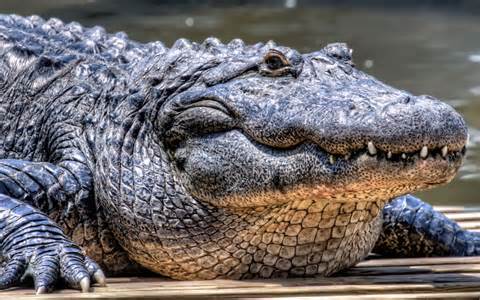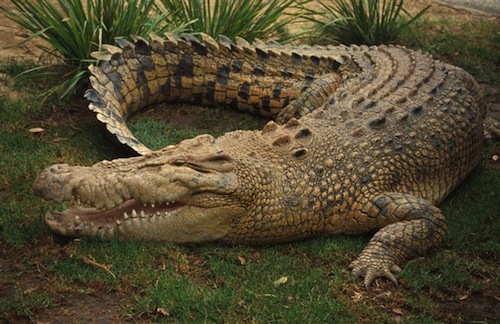Alligators and crocodiles. Which is the superior reptile? Who would win in a wrestling match? Which should you run away from? In this first installment of a new series "Animal Showdown", I research two reptiles, the alligator and the crocodile.
Although you may think alligators and crocodiles are pretty much the same, both being part of the Crocodylia order, there are key differences that make each animal unique. For one, the alligator is part of the Alligatoridae family, and the crocodile is part of the Crocodylidae family. And that's all there is to it, right? Wrong!
Where do you find them?
Alligators are found in the southeastern part of the United States (think Florida) and sometimes Eastern China. Crocodiles are pretty much everywhere, the Americas, Asia, Africa, and Australia. Alligators don't fair well in salt water, but crocodiles can live in both fresh and salt water.
Point: Crocodile
Appearance:
Alligators tend to have dark green, almost black-looking skin, while crocodiles have olive or brown skin.
The snouts of the two also differ. Crocodiles have longer snouts than alligators, and they are more narrow and v-shaped. Alligators have wide, u-shaped snouts.
Alligators have an "overbite", the upper jaw completely covers the lower jaw. Crocodiles jaws are the same width, therefore they interlock, creating that creepy toothy smile.
Alligator

Crocodile

Point: Crocodile
Big Kid on the Block
Crocodiles have been around for 55 million years, while alligators have been around for 37 million years, but really, you probably stopped counting after three million. Adult alligators can grow up to 14 feet (4.3 m), while crocodiles can grow up to 19 feet (5.8 m) or more!
Since crocodiles are larger, they are heavier; they can weigh up to 2,600 pounds (1,200 kg), that's over one ton! Alligators could stand to put some more meat on their bones, weighing between 800 (360 kg) and 1000 pounds (450 kg).
Point: Crocodile
Most Likely to Get a Time-Out
Crocodiles are known to be more aggressive, protective, and territorial. Alligators are less likely to attack a human. Believe it or not, alligators are probably more scared of you than you are of them! Crocodiles however, will attack if provoked, for food, in self-defense, and to protect their young. Alligators will most likely leave you alone if you leave them alone.
Point: Crocodile
BONUS: How to Survive an Alligator or Crocodile Attack
If you encounter an aggressive alligator or crocodile, your best option is to run away from it. Seriously, run like the wind, Bullseye. Most likely, the beast won't chase you once you're on land.
If the animal happens to bite onto you, fight back. Don't struggle to get free, this will irritate the creature more. The most sensitive parts of an alligator or crocodile are the eyes, ears, and nostrils, so grab whatever you can (or use your hands for that matter) and hit, poke, stab, like crazy. As soon as he releases his grip on you, free yourself, and run.
Score: 0:4
Which is scarier?
Hands-down, crocodiles are the scarier reptile. Not only are they larger, they are more aggressive towards would-be predators and humans. I think I can safely say, the crocodile has won this round of "Animal Showdown".
Winner: Crocodile!

Author's Note: Sources: http://www.wisegeek.org/what-is-the-difference-between-a-crocodile-and-an-alligator.htm
http://www.differencebetween.info/difference-between-alligator-and-crocodile
http://animalquestions.org/reptiles/alligators/are-alligators-more-aggressive-than-crocodiles/